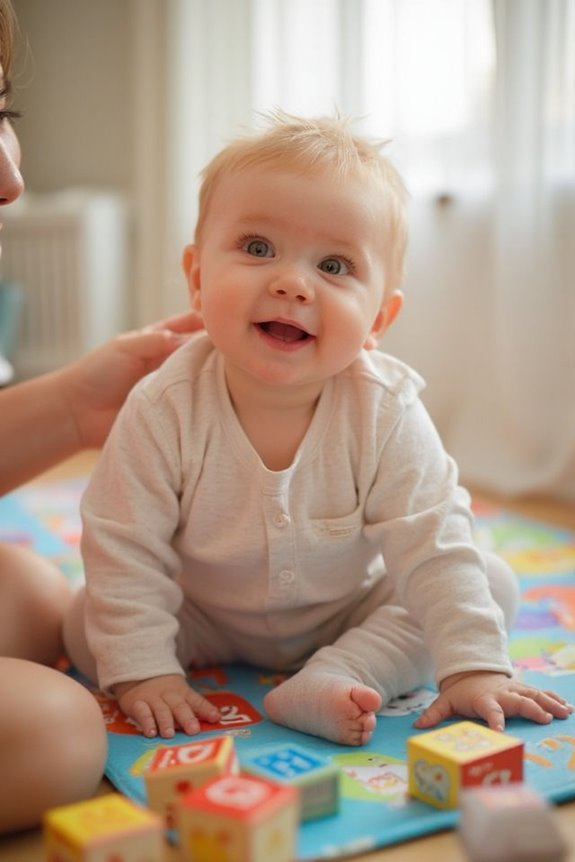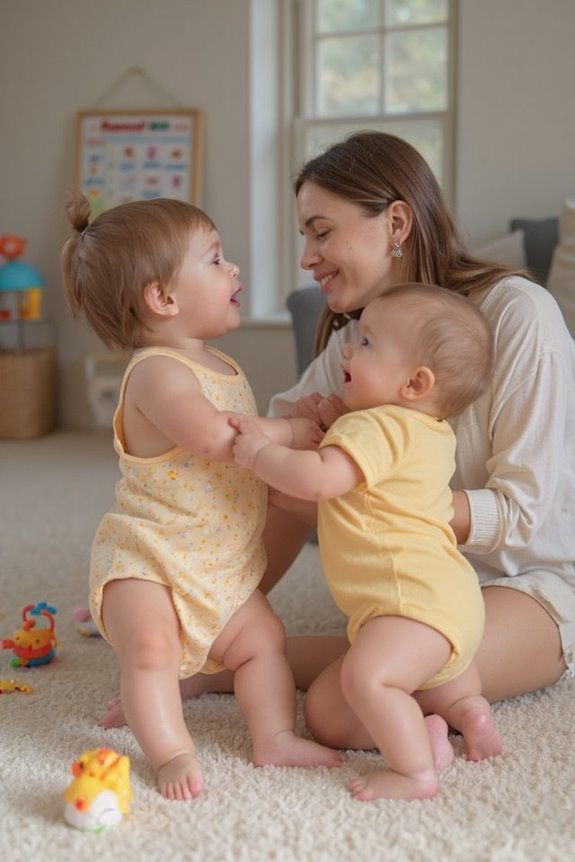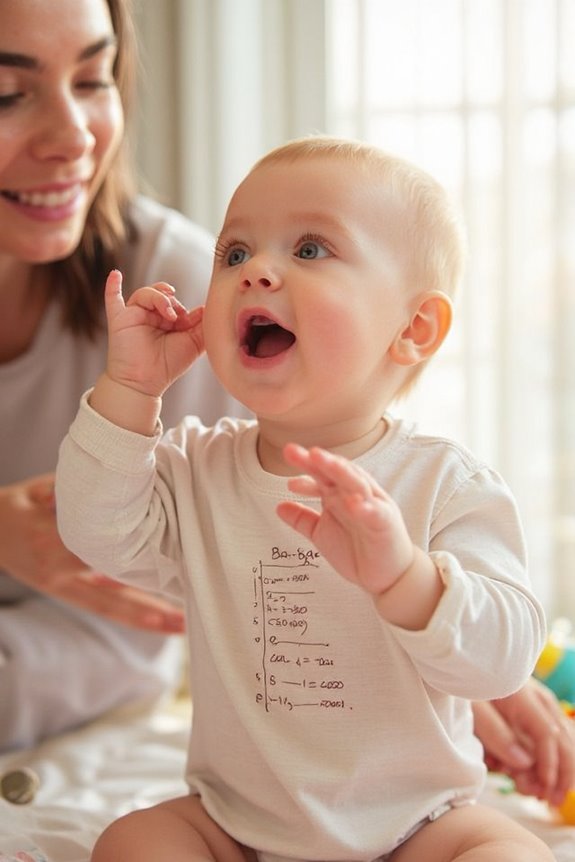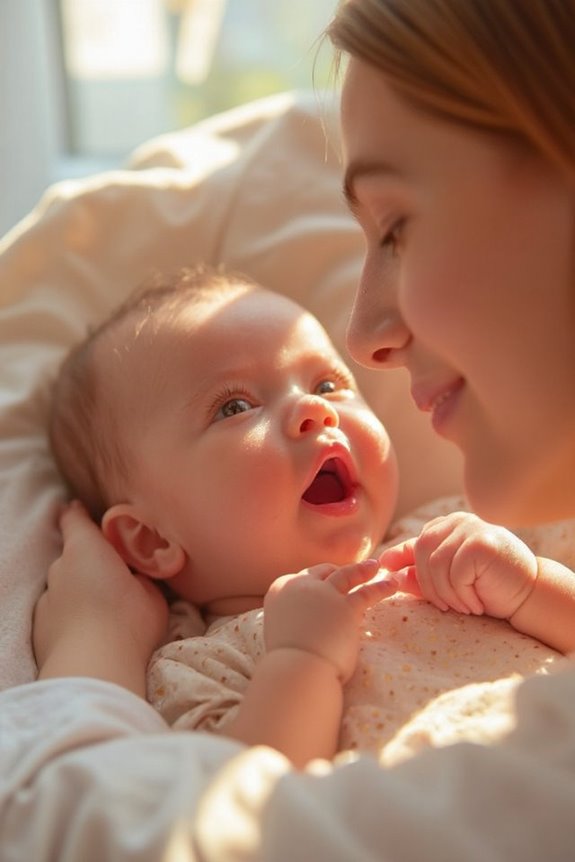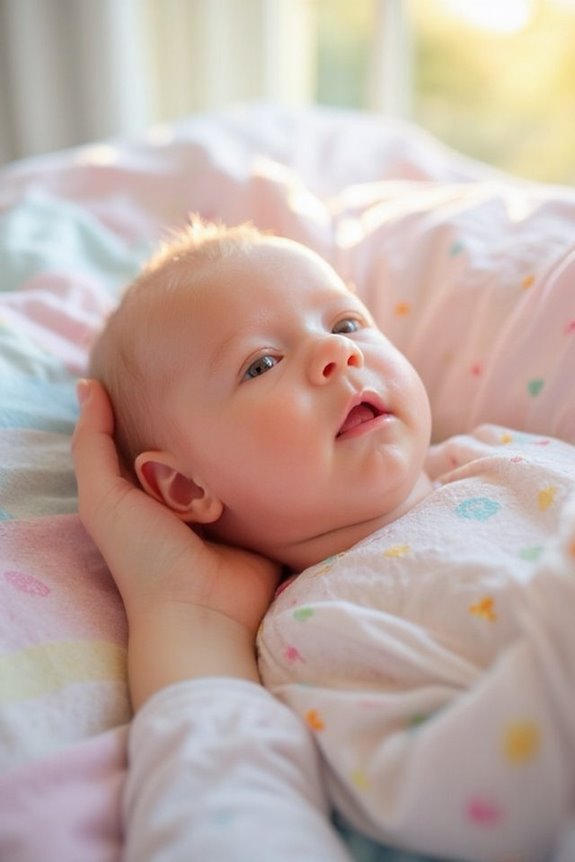Most babies say their first word between 9 and 14 months, with about 75% reaching this milestone by their first birthday. I’ve seen some early communicators use word-like sounds at 7 months, while others might not speak until 18 months. Girls often speak slightly earlier than boys. This normal developmental range depends on factors like social environment, brain development, and hearing ability. The following sections explore the fascinating journey toward your baby’s first words.
Key Takeaways
- Most babies say their first word between 9 and 14 months of age.
- By their first birthday, approximately 75% of babies have spoken a recognizable word.
- Some early communicators may use word-like sounds as young as 7 months.
- A small percentage of children may not speak their first word until 18 months.
- Girls may reach this speaking milestone slightly earlier than boys.
The Average Timeline for First Words
While every child develops at their own pace, most babies say their first word between 9 and 14 months of age. Research shows that by their first birthday, approximately 75% of babies have already spoken their first recognizable word.
The age variability for first words is considerable:
- Some early communicators may use word-like sounds as young as 7 months
- Most babies reach this milestone around 12 months
- A small percentage of children don’t speak their first word until 18 months
It’s worth noting that parental reports often identify first words earlier than scientific observations due to subjective interpretation. Girls may reach this milestone slightly earlier than boys, though individual development varies greatly regardless of gender.
What Science Tells Us About Baby Talk
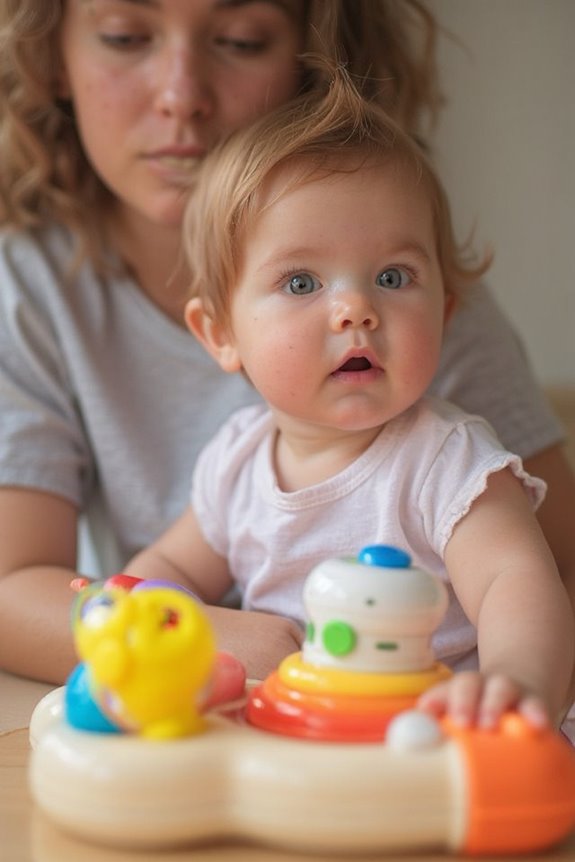
Although the term “baby talk” might sound simplistic, science reveals it’s a sophisticated linguistic tool that plays an essential role in infant development. Research using EEG technology shows that babies’ neural activity actually synchronizes with speech patterns when they hear baby talk.
The baby talk benefits extend beyond mere communication:
- Children exposed to more baby talk develop better language skills
- It helps infants recognize and produce speech sounds
- Baby talk mimics a smaller vocal tract, aiding speech production
Emotional engagement through baby talk strengthens parent-infant bonding across all cultures. Studies confirm that the exaggerated, emotionally expressive nature of baby talk promotes social, linguistic, and cognitive development. This universal preference for baby talk indicates its fundamental importance in human development.
Signs Your Baby Is Getting Ready to Speak
As parents engage in baby talk with their little ones, they’re often keenly watching for signs that their baby might soon say their first word. Several developmental milestones indicate your baby is preparing to speak:
• Eye contact during interactions (3-4 months)
- Vocal play with varied pitches and volumes (4-6 months)
- Babbling with consonant sounds like “ga-ga” (4-6 months)
- Gestural communication such as pointing or waving (8-9 months)
- Responding to simple commands (around 12 months)
- Vocal play with varied pitches and volumes (4-6 months)
Your baby’s comprehension develops before speech – they understand words before they can say them. By 8-9 months, you’ll notice jargon-like babbling that mimics the rhythm of regular speech. These vocalizations, combined with gestures and social engagement, form the foundation for their first meaningful word, typically around 12 months.
Common First Words and Their Significance
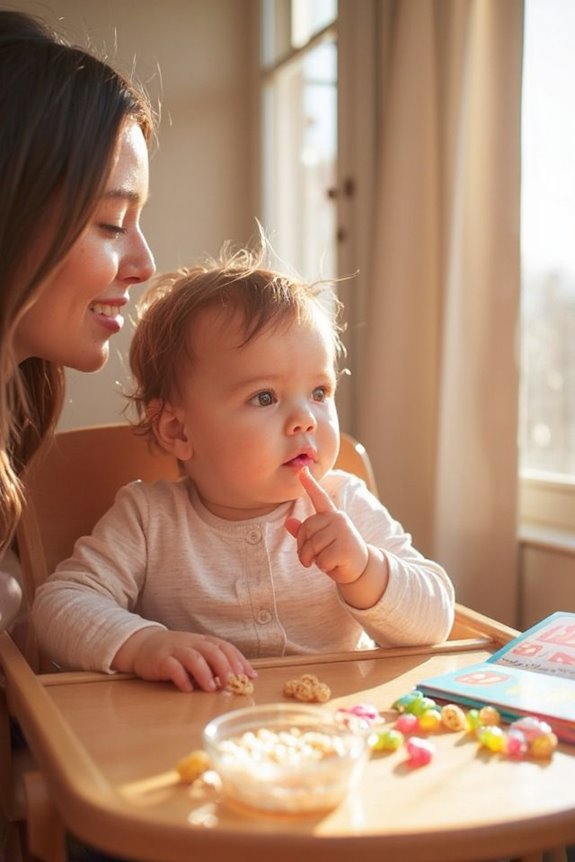
When babies finally shift from babbling to meaningful speech, certain words consistently appear across different families and cultures. “Mommy” and “Daddy” typically lead the pack, with most children saying their first word around 12 months of age.
The first word significance extends beyond mere communication:
- It marks a vital milestone in cognitive development
- Reflects the child’s emotional bonds with caregivers
- Signals the beginning of intentional language use
Cultural variations play an important role in which words emerge first. In Mexico, “water” is common, while Slovak babies might say “grandmother” early on. These differences reflect:
- Linguistic structures of the native language
- Family dynamics and caregiver roles
- Cultural emphasis on specific relationships or needs
Beyond names, common first words include greetings like “hi” and everyday objects in the baby’s environment.
Factors That Influence Speech Development
While first words celebrate a baby’s entry into verbal communication, the path to this milestone varies considerably between children. Multiple factors affect when and how babies begin to speak.
- Social influences: Children in highly verbal families hear nearly three times more words weekly than those in less verbal environments. Parental interaction quality directly impacts language scores by age nine.
- Cognitive processing: The first three years are critical due to rapid brain development. Memory, attention, and problem-solving abilities all support language acquisition.
- Perceptual factors: Hearing impairments, sensory processing issues, and recurring ear infections can delay speech development by reducing auditory input.
- Linguistic diversity: Exposure to multiple languages enriches development, while understanding language structure (grammar, syntax) forms the foundation for effective communication.
Differences Between Understanding and Speaking
Before babies utter their first recognizable word, they’ve already developed a sophisticated understanding of language. This gap between comprehension development and speech production is completely normal.
Typically, infants understand words months before they can say them. By 8 months, babies comprehend several words, while first spoken words usually emerge around 12 months. By 15 months, a child’s understanding vocabulary may include 40 words or more.
This developmental timeline varies greatly between children:
- Some babies speak recognizable words as early as 7 months
- Others may not speak until 18 months
- Comprehension almost always precedes production
Environmental factors and social interactions play essential roles in both understanding and speaking abilities, providing vital context for language acquisition and motivation to communicate.
Supporting Your Baby’s Language Journey
As your baby develops their language skills, you’ll notice an amazing transformation in how they interact with the world around them. Creating an environment that nurtures this development is essential.
I recommend:
- Engaging in interactive games like peek-a-boo to encourage turn-taking communication
- Reading aloud daily to expose your baby to diverse vocabulary
- Responding to babbling as if having a real conversation
- Minimizing background noise so they can focus on speech sounds
Track their progress by noting new words they understand and speak. By 12 months, most babies comprehend about 20 words and may speak their first few words like “hi” or “bye-bye.”
If you notice your child isn’t babbling by 7 months or using simple words by 18 months, consider consulting with your pediatrician.
When to Consult With a Pediatrician
How do you know when your baby’s speech development requires professional attention? While all children develop at their own pace, certain signs may indicate the need for pediatric assessments:
- No babbling by 6 months
- Limited vocal or gestural interaction by 12 months
- No simple words like “mama” or “dada” by 15 months
- Not understanding basic commands by 18 months
- Loss of previously acquired speech skills
I recommend scheduling a consultation with your pediatrician if you notice these potential speech delays. During the appointment, your doctor will evaluate your child’s overall development and may:
- Refer you to a speech-language pathologist
- Conduct hearing tests
- Perform thorough developmental assessments
- Create a customized support plan
Remember that early intervention often leads to better outcomes when addressing developmental concerns.
Frequently Asked Questions
Do Twins Develop Speech at the Same Time?
While you might expect mirror-like twin milestones, I’ve found twins often develop speech at different rates. Though identical twins show more speech similarities than fraternal twins, each child follows their own unique developmental timeline.
Can Learning Multiple Languages Delay First Words?
I’m happy to reassure you that learning multiple languages doesn’t delay first words. Research shows bilingual advantages outweigh concerns, and early language exposure to multiple languages actually enhances cognitive development without causing delays.
Should I Correct My Baby’s Pronunciation of Words?
I’d avoid correcting pronunciation and instead model correct speech. I find encouraging my baby’s attempts at communication builds confidence. By focusing on positive reinforcement rather than corrections, I’m supporting their natural language development journey.
Do Screen Time or Digital Devices Affect Speech Development?
I saw a toddler who couldn’t form sentences until age 3 due to constant tablet use. Yes, excessive screen time is strongly linked to speech delay. I recommend limiting devices and prioritizing face-to-face interactions.
Does Thumb-Sucking or Pacifier Use Delay First Words?
From my research, I can tell you that neither thumb sucking effects nor pacifier impact greatly delay first words. Both habits provide comfort without substantial evidence linking them to language development delays in children.
References
https://langcog.stanford.edu/papers/SYF_underreview.pdf
https://parentingscience.com/when-do-babies-say-their-first-word/
https://www.stanfordchildrens.org/en/topic/default?id=age-appropriate-speech-and-language-milestones-90-P02170
http://babieslearninglanguage.blogspot.com/2014/08/exploring-first-words-across-children.html
https://pubs.asha.org/doi/pdf/10.1044/jshd.2603.272
https://www.whattoexpect.com/first-year/first-words/
https://www.parents.com/baby/development/talking/baby-talk-a-month-by-month-timeline1/
https://www.pampers.com/en-us/toddler/development/article/when-do-babies-start-talking
https://www.nimh.nih.gov/news/science-updates/2022/toddlers-responses-to-baby-talk-linked-to-social-cognitive-language-abilities
https://news.stanford.edu/stories/2020/03/babies-love-baby-talk-world

